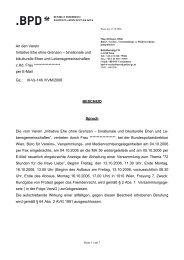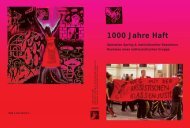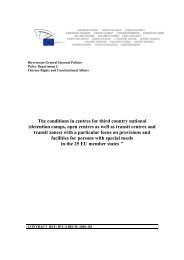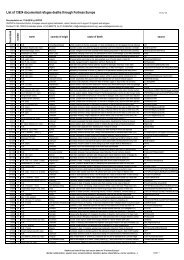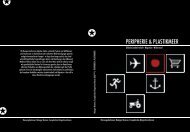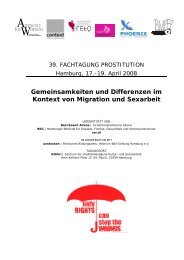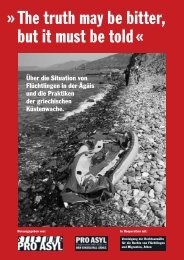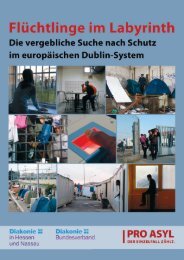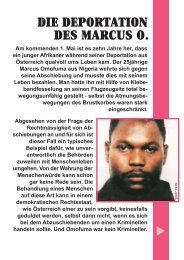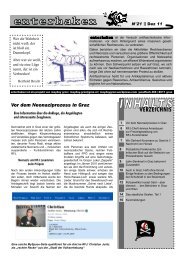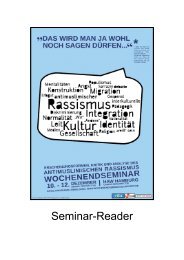Turin's CIE - International University College of Turin
Turin's CIE - International University College of Turin
Turin's CIE - International University College of Turin
Create successful ePaper yourself
Turn your PDF publications into a flip-book with our unique Google optimized e-Paper software.
status. The harmonisation <strong>of</strong> EU national systems and procedures is meant to help limit the<br />
secondary movements <strong>of</strong> asylum seekers among Member States, where such movements would<br />
be caused by differences in the national legal frameworks.<br />
EU Directive 2003/9/EC establishes that applicants must be informed “<strong>of</strong> at least any<br />
established benefits and <strong>of</strong> the obligations with which they must comply relating to reception<br />
conditions” 154 . As a general rule, Member States shall allow asylum seekers freedom <strong>of</strong><br />
movement within their territory or within an assigned area 155 . However, according to Article<br />
7(3), “when it proves necessary, for example for legal reasons or reasons <strong>of</strong> public order,<br />
Member States may confine an applicant to a particular place in accordance with their national<br />
law”. Member States shall ensure asylum seekers’ rights in terms <strong>of</strong>: family unit 156 , access to the<br />
education system for minors 157 and material reception conditions and health care 158 . Special<br />
provisions must be applied to people with special needs, such as minors and victims <strong>of</strong> torture<br />
and violence 159 .<br />
EU Directive 2004/83/EC aims to ensure that Member States apply common criteria for the<br />
identification <strong>of</strong> persons in need <strong>of</strong> international protection and that a minimum level <strong>of</strong><br />
benefits are available for these people in all Member States. <strong>International</strong> protection is a<br />
broader concept than political asylum and it includes both the refugee status and the subsidiary<br />
protection status. Therefore, the rights and benefits related to humanitarian protection are<br />
granted also to persons eligible for subsidiary protection, who are defined as third-country<br />
nationals who do not qualify as refugees but who, if returned to their country <strong>of</strong> origin, would<br />
face a real risk <strong>of</strong> suffering serious harm, and who are unable or unwilling to avail themself <strong>of</strong><br />
the protection <strong>of</strong> that country 160 . According to Article 4(3), the assessment <strong>of</strong> an application for<br />
international protection is to be carried out on an individual basis and includes taking into<br />
account: the facts relating to the applicant’s country <strong>of</strong> origin; documentation and statements<br />
presented by the applicant including information on whether the applicant has been or may be<br />
subject to persecution or serious harm; and the individual position and personal circumstances<br />
<strong>of</strong> the applicant. Chapter VII <strong>of</strong> EU Directive 2004/83/EC lists the whole range <strong>of</strong> rights and<br />
benefits that Member States have to guarantee to persons who have recognised subsidiary<br />
protection status.<br />
EU Directive 2005/85/EC aims to establish common standards and procedures for granting and<br />
withdrawing refugee status throughout the EU. The Directive provides procedural guarantees<br />
for applicants, such as the rights: to be informed about the procedure in a language they can<br />
understand; to access legal assistance; to communicate with the UNHCR; and to receive the<br />
services <strong>of</strong> an interpreter 161 . Applicants should also be given the opportunity to have a personal<br />
interview before a decision is taken and Member States must ensure that a written report is<br />
made containing the essential information about the application as reported by the applicant 162 .<br />
Moreover, EU Directive 2005/85/EC sets minimum requirements for the decision-making<br />
process: decisions should be taken individually, objectively and impartially; precise and up-todate<br />
country <strong>of</strong> origin information should be obtained by different sources; and the personnel<br />
examining applications and taking decisions should be specialised in the field <strong>of</strong> refugee and<br />
154 Directive 2003/9/EC, Article 5(1).<br />
155 Directive 2003/9/EC, Article 7(1).<br />
156 Directive 2003/9/EC, Article 8.<br />
157 Directive 2003/9/EC, Article 9.<br />
158 Directive 2003/9/EC, Articles 13, 14 and 15.<br />
159 Directive 2003/9/EC, Articles 17, 18, 19 and 20.<br />
160 Directive 2004/83/EC, Article 2(f).<br />
161 Directive 2005/85/EC, Articles 10(1) and 15.<br />
162 Directive 2005/85/EC, Articles 12 and 14.<br />
78 | P a g e




